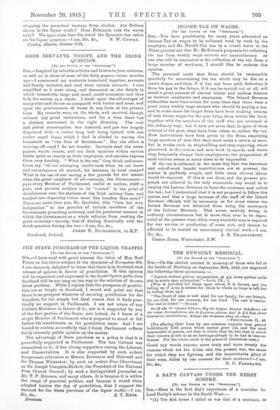INCOME TAX ON WAGES.
[To Tan Eurroa or Tun " SPEcrTATOR."] Site,—You have persistently for ninny years advocated an Income Tax on wages to be collected week by week by the employer, and Mr. Harold Cox has in a recent letter to the Times pointed out that Mr. McKenna'a proposals for collecting the tax from weekly wage earners are unsatisfactory. As one who will be interested in the collection of the tax from a large number of workmen, I should like to endorse this opinion.
The proposal made that firms should be responsible quarterly for ascertaining the tax which may be due on a man's wages, and then, if it has not been paid, deducting it from his pay in the future, if it can be carried out at all, will entail a great amount of clerical labour and endless friction as between employers and employees. The Inland Revenue authorities have been aware for some time that there were a great many weekly wage earners who should be paying a tax, and in some cases the larger firms have been making returns of men whose wages for the year bring them within the limit, together with the members of the staff who are returned in the ordinary way; but it does not seem that, in spite of these returns in the past, steps have been taken to collect the tax. Now instructions have been given to the firms employing large numbers of men that they must make a return at once; but in trades such as shipbuilding and ship-repairing, where piecework is the custom and men work in squads. and where they frequently change their employment, the preparation of such returns seems in many oases to be impossible.
If the tax is collected iu the same way that the insurance and out-of-work benefit contributions are at present, the matter is perfectly simple, and little extra clerical labour would be required. If this is not done, and the present pro- posals are adhered to. the only reasonable way would be to employ the Labour Bureaux to trace the workmen and collect the tax; but I understand that it is not proposed to follow this course, and that a large increase of the staff of the Inland Revenue officials will be necessary, as for some reason the Inland Revenue are debarred from using the machinery of the Labour Bureaux. This seems entirely wrong in ordinary circumstances, but is more than ever to be depre- mited at the present time, when every available man is required for war service or production of some sort, and cannot be afforded to be wasted on unnecessary clerical work.—I am,
Sir, &c., J. E. THORNYCILOFT. Caton House, Westminster, S. W.














































 Previous page
Previous page